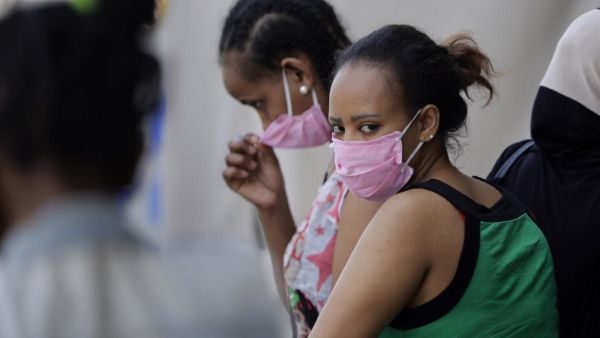A number of Sudanese workers protested in front of their country’s Embassy Friday, demanding to be paid and to return home as Lebanon’s economic situation deteriorates.
The Sudanese workers gathered in front of their embassy in Koraitem told local broadcaster LBCI they had been sitting at home for months because of the coronavirus crisis, and that they didn’t have money to eat.
“We want to send a message to our country ... to facilitate our return,” one man said.
“Neither an employee, nor the ambassador nor the consul has come out to speak with us,” another man said.
Thousands of migrant workers from countries like Sudan, Bangladesh, Ethiopia, Sierra Leone and the Philippines have been left jobless, unpaid or with slashed salaries, becoming unable to pay their rents and for necessities, and as a result have registered to leave Lebanon and return to their home countries.
Employers have become increasingly unable to pay their migrant workers in US dollars amid a severe shortage of the American currency, as the country’s economy nears collapse, with the Lebanese pound having lost more than 60 percent of its value against the dollar.
On Wednesday and throughout the week, dozens of Ethiopian domestic workers camped out in front of the Ethiopian Consulate in Hazmieh, after they were dumped by their employers near the embassy building.
Many are not in possession of their passports or belongings, and are owed months of pay.
The Labor Ministry transported a number of them to hotels, while Caritas – a humanitarian organization – also took in around 36 Ethiopian workers Friday.
According to Amnesty International, more than 250,000 migrant domestic workers are present in Lebanon. They all work under the Kafala system, which is a migration sponsorship framework that makes way for exploitation, abuse and trafficking, leaving migrant workers in extremely vulnerable positions.
Ethiopia had sent two noncommercial flights to repatriate its citizens in early May, but the flights were postponed due Cabinet’s decision to extend lockdown until July 5. Beirut’s Rafik Hariri International Airport was shut down on March 18 for commercial flights, as part of the government’s lockdown measures against the coronavirus pandemic.
There have been over 10,000 requests from migrant workers to leave the country, according to Dima Haddad, project officer for the UN Migration Agency in Lebanon.








